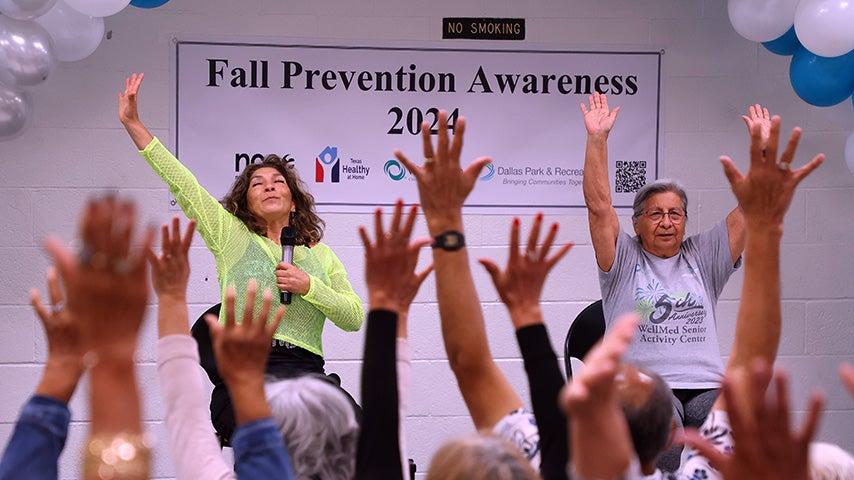National Plan Outlines Steps to Reduce Falls among Older Americans
2 min read

Investing $45 million a year in falls prevention programs could save up to $1.2 billion annually
Contact
Simona Combi
Public Relations Manager
571-527-3982
simona.combi@ncoa.org
Sep. 17, 2025, Arlington, VA—The National Council on Aging (NCOA), the national voice for every person’s right to age well, today released the 2025 National Falls Prevention Action Plan, an integrated strategy to significantly reduce the number of falls among older adults—one of the nation’s most pressing but rarely addressed public health challenges.
The Action Plan provides concrete steps to reduce the number of falls and fall injuries among older Americans over the next 10 years. The plan is being released in advance of this year’s annual Falls Prevention Awareness Week, September 22-26.
“It's time to stop falls in their tracks, so we can save lives and money,” said Ramsey Alwin, NCOA president and CEO. “As a nation, we can do much more to help older adults avoid falls and their devastating effects and costs. Falls prevention requires a multi-disciplinary approach, and that’s exactly what this plan proposes.”
“We all know the saying ‘an ounce of prevention is worth a pound of cure,’ and the cheapest medical visit is the one that never has to happen. That’s why preventative action can be a win-win for older people across Maine and the nation, as well as the taxpayers,” said Senator Angus King of Maine, co-founder of the Congressional Task Force on Falls Prevention.
The 2025 National Falls Prevention Action plan is a critical step forward in ensuring older people have access to dedicated resources and quality care needed to stand strong. I want to thank the National Council on Aging for their leadership in preventing falls and keeping our loved ones and communities safer and healthier.”
“Falls are not an inevitable part of aging. They are a serious but preventable public health issue that costs the nation billions in avoidable health care expenses each year. For more than a decade, ACL has made significant investments in numerous evidence-based falls prevention programs,” said Mary Lazare, Acting Assistant Secretary for Aging and Administrator of the Administration for Community Living (ACL). “In the coming year and beyond, ACL’s focus will be on scaling a universal approach that allows for nationwide data collection, evaluation and outcomes that will reflect the return on investment. This strategy will focus national, state, and local efforts on a common approach to reduce falls.”
Fourteen million (1 in 4) Americans age 65+ fall each year. Falls are the leading cause of fatal and non-fatal injuries among older adults, causing loss of independence and social isolation. With over 36 million fall incidents annually, falls cost Medicare $80 billion every year. By 2030, the cost of treating all fall-related injuries is projected to reach $101 billion.
Yet, falls are preventable, and evidence-based programs that reduce falls risks can help older adults stay independent and engaged in their communities. New NCOA research reveals that participants in these programs experience a 56% reduction in the number of injurious falls; a 52% reduction in the number of times fallen; a 26% reduction in hospital admissions; and an 18% reduction in emergency room visits due to a fall.
Based on these findings, researchers estimate that a $45 million annual investment in falls prevention programs could save the federal government between $263 million and $1.2 billion in Medicare and Medicaid costs annually.
The National Falls Prevention Action Plan was developed collaboratively over a year, culminating in a two-day summit that drew 182 invited participants from 112 entities representing government, health care, aging services, disability services, technology, nutrition, housing, academia, philanthropy, and communications.
The plan outlines six integrated goals:
- Expand awareness by launching a national communications campaign to increase and reframe the public’s understanding of falls, build knowledge about how to avoid them, and boost demand for programs that help prevent them.
- Broaden funding by increasing and coordinating spending on falls prevention awareness, screening, assessment, intervention, and management and make it easier to obtain this funding from governments, health systems, insurers, and philanthropies.
- Scale interventions by expanding clinical interventions and community-based prevention programs, so there is capacity to help all older people at risk.
- Coordinate care by creating an infrastructure that supports partnerships among health care providers and community-based aging networks, public health, and other social service providers.
- Harness technology by persuading hardware and software developers and falls experts to collaborate on falls prevention products that are accessible and meet the needs of older adults.
- Improve data collection and research by gathering more and better information about which older adults fall and why and conducting studies to understand their challenges and needs.
The 2025 plan expands on proposals issued in 2005 and 2015 and addresses enduring challenges. These include stigma related to falling, lack of awareness about the issue and what can be done, and lack of coordination among community and clinical providers who can make a difference.
“By working to reduce falls among older Americans, we allow for healthier, more independent lives. We also lessen the financial burden on our health care system,” said Senator Mike Rounds of South Dakota. “I’m proud to work alongside Senator King to implement practical solutions to benefit our seniors and taxpayers.”
“The Action Plan details not only the steps required to realize each goal, but also the potential barriers to success,” Alwin said.
NCOA looks forward to working with a broad range of partners in government, health and social services, industry, and others to move this ambitious plan into action.”
About NCOA
The National Council on Aging (NCOA) is the national voice for every person’s right to age well. Working with thousands of national and local partners, we provide resources, tools, best practices, and advocacy to ensure every person can age with health and financial security. Founded in 1950, we are the oldest national organization focused on older adults. Learn more by following us at @NCOAging.